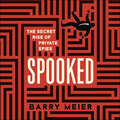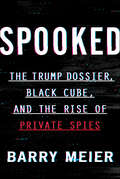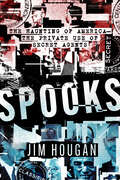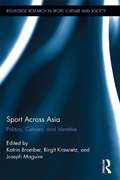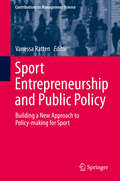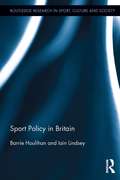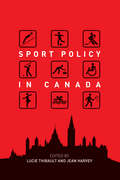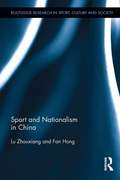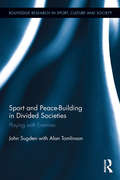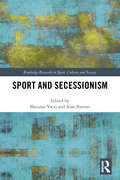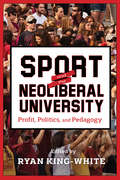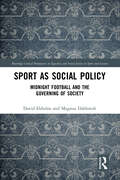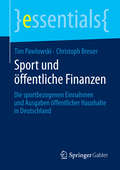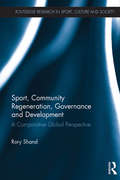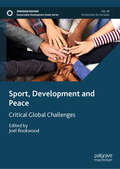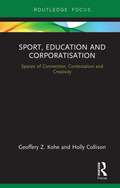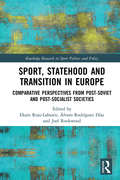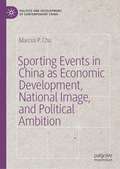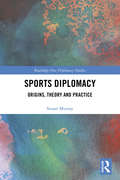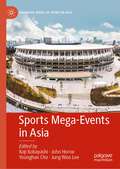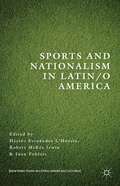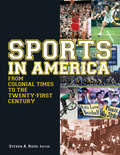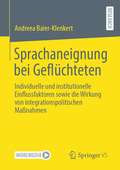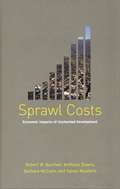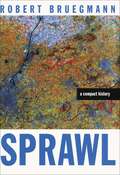- Table View
- List View
Spooked: The Secret Rise of Private Spies
by Barry MeierThis is a spy story like no other. Private spies are the invisible force that shapes our modern world.Private spies are influencing our elections, shaping the future of Hollywood, effecting government policies and the fortunes of companies. More deviously, they are also peering into our personal lives as never before, using off-the shelf technology to listen to our phone calls, monitor our emails and decide what we see on social media.Spooked takes us on a journey into a secret billion-dollar industry in which information is currency and loyalties are for sale. An industry so tentacular it reaches from Saddam Hussein to an 80s-era Trump, from the Steele dossier written by a British ex-spy to Russian oligarchs sitting pretty in Mayfair mansions, from the devious tactics of Harvey Weinstein to the growing role of corporate spies in politics and the threat to future elections.Spooked reads like the best kind of spy story: a gripping tale packed with twists and turns, uncovering a secret side of our modern world.(P) 2020 Hodder & Stoughton Ltd
Spooked: The Trump Dossier, Black Cube, and the Rise of Private Spies
by Barry MeierA Pulitzer Prize winning investigative journalist’s journey into a billon-dollar secret industry that is shaping our world – the booming business of private spying, operatives-for-hire retained by companies, political parties and the powerful to dig up dirt on their enemies and, if need be, destroy them. For decades, private eyes from Allan Pinkerton, who formed the first detective agency in the U.S., to Jules Kroll, who transformed the investigations business by giving it a corporate veneer, private spies were content to stand in the shadows. Now, that is all changing. High-profile stories grabbing recent headlines – the Steele Dossier, Black Cube, the Theranos scandal, Harvey Weinstein’s attacks on his accusers – all share a common thread, the involvement of private spies. Today, operatives-for-hire are influencing presidential elections, the news media, government policies and the fortunes of companies.. They are also peering into our personal lives as never before, using off-the shelf technology to listen to our phone calls, monitor our emails, and decide what we see on social media. Private spying has never been cheaper and the business has never been more lucrative—just as its power has never been more pervasive. Spooked is a fast-paced, disturbing and, at times, hilarious tour through the shadowlands of private spying and its inhabitants, a grab-bag collection of ex-intelligence operatives, former journalists and lost souls. In this hidden world, information is currency, double-crosses are commonplace, and hacking can be standard procedure. Drawing on his journalistic expertise and unique access to sources, Barry Meier uncovers the secrets private spies want to keep hidden.
Spooks: The Haunting of America—The Private Use of Secret Agents
by Jim Hougan&“Probably the most eye-opening and engrossing exposé to date of the bizarre &‘power games&’ played by multinational corporations and tycoons.&” —Publishers Weekly A classic of investigative reporting, Spooks is a treasure trove of who-shot-who research on the metastasis of the US intelligence community, whose practices and personnel have engulfed the larger society. Teeming with tales of wiremen, hitmen, and mobsters; crooked politicians and corrupt cops going about their business of regime-change, union-busting, wiretapping, money laundering, and industrial espionage, read about: • Richard Nixon&’s &“Mission Impossible&” war on Aristotle Onassis • Not-so-deep-fake porno films starring the CIA&’s enemies • The Robert Vesco heist, targeting billions in numbered Swiss accounts • Robert Maheu and the kidnapping of billionaire Howard Hughes • The murder-for-hire of a Columbia University professor • Bobby Kennedy&’s archipelago of private intelligence agencies—Intertel and the &“Five I&’s&” • &“The Friendly Ghost&” and Nixon&’s secret account in the offshore Castle Bank & Trust &“One of the best non-fiction books of the year, a monument of fourth-level research and fact-searching.&” —Los Angeles Times&“This book will curl your hair with its revelations and the names it names. A landmark book in its field of investigative reporting.&” —John Barkham Reviews &“Hougan is a superb storyteller and the pages teem with unforgettable characters. Admirable.&” —The Washington Post &“Hougan is exhilarating on the mystique of spooks.&” —The New York Review of Book
Sport Across Asia: Politics, Cultures, and Identities (Routledge Research in Sport, Culture and Society #21)
by Joseph Maguire Katrin Bromber Birgit KrawietzThis book is designed to reflect both our current knowledge regarding sport, globalisation and ‘"encounters" with several important "post-colonial" or non-western societies and to draw together scholars from a range of different disciplines. Case studies of cultural encounters in Central, South-East Asia, Asia Minor and the Arabian peninsula capture the paradoxical processes of emulation, resistance and transformation that are at work in the diffusion and development of "sport" and body cultures. These case studies bring together insights from anthropology, cultural studies, geography, history, law, sociology, various area and post-colonial studies.
Sport Entrepreneurship and Public Policy: Building a New Approach to Policy-making for Sport (Contributions to Management Science)
by Vanessa RattenThis book revisits the traditional general approach to sport policy by adopting an entrepreneurial perspective. The respective chapters, all written by recognized experts, link a fragmented collection of treatises on entrepreneurship, public policy and sport entrepreneurship to develop a coherent, unified perspective on policy-making. The book’s central argument is that, while in the past, sport policy focused more on governance and political elements, these aspects can also be embedded into a ‘policy entrepreneurship’ perspective. To date, most sport policy research has also tended to pursue an organizational behavior or political science approach. Breaking with that trend, the book incorporates the nascent sport entrepreneurship literature into this approach. The new strategies proposed here offer valuable resources for public policy planners and sports managers alike, two groups who need to work together to build better policy initiatives.
Sport Policy in Britain: Sport Policy In Britain (Routledge Research in Sport, Culture and Society #18)
by Barrie Houlihan Iain LindseySince 1990, Britain has seen a period of unprecedented public investment in, and political commitment to, sport. In this book, Iain Lindsey and Barrie Houlihan examine and analyze sport policy since the appointment of John Major as leader of the Conservative Party in 1990. John Major’s period as Prime Minister was a watershed in British sport policy marking the beginning of a prolonged period of public and lottery investment and relatively high political salience. The text also locates Labour sport policy not only in relation to the previous government of John Major, but also in relation to the Labor government’s broader concerns and ambitions related to modernization of British institutions, its ambition to tackle the ‘wicked issues’ epitomized by its focus on achieving greater social inclusion, and its interest in facilitating greater stakeholder involvement in the policy process. Lindsey and Houlihan provide the first analysis that examines sport policy as a field of government and that discusses how the various sectors (e.g. youth/school sport, mass sport, etc.) have been affected by government policy and the competition for public resources.
Sport Policy in Canada (Open Access)
by Lucie Thibault and Jean HarveySport Policy in Canada provides the first and most comprehensive analysis of the new Canadian Sport Policy adopted in 2012. In light of this new policy, the authors, top scholars in the field, provide detailed accounts of the most salient sport policies and programs, while also discussing issues and challenges facing policy makers. In Canada and around the world, the last decades have known a sharp increase in state intervention and public funding in pursuit of medals on the international stage and in support of a more active lifestyle. Governments at all levels have made substantial investments in hope of hosting major sporting events to benefit from the economic impact and gain international prestige.The study of sport policies, often neglected in the past, is becoming an increasingly important research topic. Sport Policy in Canada seeks to fill this void by offering the most comprehensive analysis of sport policy since Macintosh, Bedecki, and Franks' Sport Policy in Canada (1987). - This book is published in English.
Sport and Nationalism in China: Sport And Nationalism In China (Routledge Research in Sport, Culture and Society #29)
by Fan Hong Zhouxiang LuThis book examines the relationships between sport, nationalism and nation building in China. By exploring the last 150 years of Chinese history, it offers unparalleled depth and breadth of coverage and provides a clear grasp of Chinese sports nationalism from both macro and micro perspectives. Beginning with a discussion on the role of sport in the Qing Dynasty’s Self-Strengthening Movement (1861-1895), the book examines how sport contributed to the shaping of the early forms of Chinese nationalism in the late 19th century. It identifies and defines the core functions of sport in the Chinese Nationalist Revolution which successfully transformed China from a culturally bound empire to a modern nation state in 1911. The following section, on the Republic of China Era (1912-1949), explores the interactions between sport and the construction of Chinese nationalism and national consciousness, illustrating how sport played its part in the building of the newly established nation state. Moving on to the Communist China Era (1949-present), the book scans the whole spectrum of both modern and contemporary Chinese nationalism and interprets the most important issues on the course of China’s nation building, explaining why sport is so tightly bound up with nationalism and patriotism, and how sport became an essential part of nationalists', politicians' and educationalists' strategy to revive the Chinese nation.
Sport and Peace-Building in Divided Societies: Playing with Enemies (Routledge Research in Sport, Culture and Society)
by Alan Tomlinson John SugdenSport is a cultural institution that stands at the interface between political and civil society. In divided communities, sport has been an agent of separation, sectarian hatred and violence, but also a highly effective tool for conflict resolution, reconciliation and peace-building. In this important study, John Sugden and Alan Tomlinson draw on their extensive international experience of working with divided communities to develop a methodological and theoretical model for peace-building in sport. The book showcases original case studies from three regions of the world in which sport has played a prominent role in social deconstruction and reconstruction: Northern Ireland, Israel/Palestine and South Africa. Combining a wealth of primary and secondary data, the authors chart the rise of the contemporary Sport for Development and Peace movement (SDP) and outline an important new practice-based framework for understanding, researching and working to achieve positive social change in the SDP sector. This is essential reading for any student, researcher or practitioner with an interest in the sociology of sport, sport development, international development, peace studies or conflict resolution.
Sport and Secessionism (Routledge Research in Sport, Culture and Society)
by Alan Bairner Mariann VacziSport and Secessionism examines how sporting cultures reflect, inform and sometimes frustrate secessionist movements around the world. Investigating a wide range of cases, the book explores key themes including nationalism, nation building, state-region antagonisms, independence movements, identity and ethnic politics, sovereignty and autonomy processes, all through the lens of sport. Sports are uniquely positioned to shed light on secessionist politics due to their pervasiveness in society, and their ability to absorb, reflect, and produce political projections. The book presents analyses of a wide range of geographical, cultural and political contexts in which sports are deployed to pursue regional independence, or greater sovereignty and autonomy, and explores the dual processes of sub-national identity construction and state sovereignty deconstruction. The book includes fourteen cases from such diverse parts of the world as Ireland, Taiwan, Turkey, Catalonia, Biafra, Canada and the UK, among others. Offering a unique perspective on an important geopolitical issue, this book is fascinating reading for anybody with an interest in sport and politics, the sociology of sport, political science, political geography, nationalism studies, or international history.
Sport and the Neoliberal University: Profit, Politics, and Pedagogy
by Susan Searls Giroux Joshua I. Newman Michael D. Giardina Ryan King-White Henry Giroux Neal C. Ternes Jaime DeLuca Callie Batts Maddox Matthew G. Hawzen Lauren C. Anderson Ellen J. Staurowsky Richard M. Southall Crystal Southall Oliver Rick Adam Beissel Jacob J. Bustad Ronald L. MowerCollege students are now regarded as consumers, not students, and nowhere is the growth and exploitation of the university more obvious than in the realm of college sports, where the evidence is in the stadiums built with corporate money, and the crowded sporting events sponsored by large conglomerates. The contributors to Sport and the Neoliberal University examine how intercollegiate athletics became a contested terrain of public/private interests. They look at college sports from economic, social, legal, and cultural perspectives to cut through popular mythologies regarding intercollegiate athletics and to advocate for increased clarity about what is going on at a variety of campuses with regard to athletics. Focusing on current issues, including the NCAA, Title IX, recruitment of high school athletes, and the Penn State scandal, among others, Sport and the Neoliberal University shows the different ways institutions, individuals, and corporations are interacting with university athletics in ways that are profoundly shaped by neoliberal ideologies.
Sport as Social Policy: Midnight Football and the Governing of Society (Routledge Critical Perspectives on Equality and Social Justice in Sport and Leisure)
by Magnus Dahlstedt David EkholmThis book analyses the increasing use of sport in European and Western welfare states as a tool of social policy and its promotion as a solution to social problems. Midnight Football is a sports-based intervention targeting social inclusion and crime prevention in young people aged 12–25 in Sweden. This book takes a close look at its organization, pedagogy and potential outcomes. Drawing on cutting-edge research into Midnight Football in Sweden, and exploring other community sport programmes including Midnight Basketball in the United States, this book shines new light on broader social transformations regarding urban segregation and social exclusion, social policy and the governing of welfare and social policy. This book also offers new perspectives on how sport and the lives of young people intersect with and shape broader shifts in welfare and social policy in Western states, shifts that are manifested in increased inequality, social polarization and profound changes in urban geographies. This is fascinating reading for anybody with an interest in the relationships between sport and wider society, or in sport development, sport policy, social policy, public policy or youth and social work.
Sport und öffentliche Finanzen: Die sportbezogenen Einnahmen und Ausgaben öffentlicher Haushalte in Deutschland (essentials)
by Tim Pawlowski Christoph BreuerDem Sport werden zahlreiche Gemeinwohlfunktionen zugeschrieben. Aus diesem Grund wird er mit öffentlichen Mitteln gefördert. In welchem Umfang der Sport in Deutschland auf diese Weise gefördert wird und insbesondere welche Mittel aus dem Sport wieder an die öffentlichen Haushalte zurückfließen, war bislang unklar. Auf Basis einer Vielzahl von Datenquellen werden in diesem Beitrag die sportbezogenen direkten Einnahmen und Ausgaben der öffentlichen Haushalte systematisch abgeschätzt. So ergibt sich - je nach Abgrenzung des Sportsektors - ein differenziertes Bild der finanzpolitischen Bedeutung des Sports in Deutschland.
Sport, Community Regeneration, Governance and Development: A comparative global perspective (Routledge Research in Sport, Culture and Society)
by Rory ShandSporting mega events are playing an increasingly important role in the governance of community regeneration and development across the globe. This book examines the ways in which sporting organisations engage with local communities through projects that target youth, health or social issues and act as key partners in governance mechanisms. Showcasing original research to suggest that sporting organisations, mega events and legacies are now operating as governing instruments in renewal programmes, it sheds new light on the role that sport plays in community regeneration and development on an international scale. Drawing on the interpretivist approach to governance which bridges theory and practice, the book considers how relationships between sporting mega events, legacies and local communities are evolving to foster trust and encourage participation. With international case studies from the UK, Brazil and South Africa, it reflects on best practice in relation to governance structure, funding mechanisms and partnerships. Sport, Community Regeneration, Governance and Development: A Comparative Global Perspective is fascinating reading for all students and scholars with an interest in governance, sport development, sport policy, sport management or the sociology of sport.
Sport, Development and Peace: Critical Global Challenges (Sustainable Development Goals Series)
by Joel RookwoodThis volume offers a comprehensive exploration of the rapidly evolving landscape of Sport for Development and Peace (SDP), a critical approach to peacebuilding, economic development, and social transformation gaining increasing stature during the last twenty-five years. Contributors here scrutinize the diversification in SDP methods and ideals, spotlighting global dimensions and differences in this burgeoning field. Encompassing contributions from scholars across five continents, the chapters illuminate diverse approaches and analyses, reflecting a variety of viewpoints and experiences. The volume highlights the heterogeneity within SDP and assesses the trajectory of SDP studies, while also identifying common threads among seemingly disparate approaches. Further, it investigates sport's role in responding to global challenges, from financial crises to the COVID-19 pandemic, climate change, and conflicts, and although sport is often recognized for its potential to foster peace and development, this book navigates the intricate complexities and contradictions that can arise in the practice of harnessing sport for these goals. With 14 engaging chapters, the book delves into a range of topics, including critical analyses of different SDP approaches, the sustainability of sport initiatives, alignment of SDP with sustainable development goals, and the use of sport in refugee resettlement. It also examines sport's contribution to societal outcomes like health, education, inequality reduction, and peace, while discussing challenges faced in the field. Moreover, the volume explores the connections between SDP and indigenous philosophies, feminism, local community development, and issues of violence within prisons. Offering a holistic view of SDP's evolution and impact, presenting fresh perspectives as well as critical insights for scholars, practitioners, and policymakers in the realm of international sport, development, and peacebuilding, this volume marks itself an essential resource for understanding the multifaceted landscape of SDP.
Sport, Education and Corporatisation: Spaces of Connection, Contestation and Creativity (Routledge Focus on Sport, Culture and Society)
by Holly Collison Geoffery Z. KoheUsing an interdisciplinary approach, Sport, Education and Corporatisation offers an important critique of the intersection between sport organisations, commercial agendas and educational development. It reveals a discomforting interplay between sector stakeholders that has been normalised via discourses of civic ‘good’, social responsibility and community welfare. The book employs stakeholder theory, corporate social responsibility ideals, and holistic constructions of space to provide a framework to understand some of the latent and explicit complexities of sport sector connectivity. Interrogating the key contexts, issues and challenges that emerge from the Sport-Education-Corporate nexus and drawing upon evidence from international, national and local sport organisations, it argues for sustained and rigorous examination of the commercialisation of educational agendas and new directions for education-based corporate social responsibility within the sport industry. This is an invaluable resource for researchers working in the areas of sport management; sport development; sociology of sport; sport policy and politics; physical education; and the wider economics, organisational politics and business ethics fields. It is also a fascinating read for students within sport business management, sports studies, sport politics and physical education programmes.
Sport, Statehood and Transition in Europe: Comparative perspectives from post-Soviet and post-socialist societies (Routledge Research in Sport Politics and Policy)
by Ekain Rojo-LabaienThis book examines the political significance of sport and its importance for nation-state building and political and economic transition across thirteen post-Soviet and post-socialist countries, primarily located in Eastern Europe. Adopting a critical case-study approach, building on historical and comparative frameworks, the book uses sport as a symbolic lens through which to examine the transition of Eastern European countries to the Western capitalist system. Covering a wide geographical area, from Poland to the Caucuses and Turkmenistan, it explores key themes such as nationalism, governance, power relations, political ideology, separatism, commercialisation and economic development, and the symbolic value of mega-events. Sport, Statehood and Transition in Europe is fascinating reading for anybody with an interest in sport policy, the politics of sport or political science.
Sporting Events in China as Economic Development, National Image, and Political Ambition (Politics and Development of Contemporary China)
by Marcus P. ChuThis book analyzes the motivations of the Chinese authorities to pursue the international sporting events. It investigates the 21 oft-underappreciated sporting events governed by FIFA, FINA, FIBA, IAAF, and other international organizations, and linking them with the calculus of the Chinese authorities to push forwards economic development, polish national image, and realize the supreme leaders’ political ambitions. The author therefore sheds important light on the intertwined nature of sport and politics in the Chinese state and reveals how pervasive the sporting events’ roles have been in China’s domestic politics and international relations. This book’s broad scope is expected to attract the subscriptions of the academics, think tanks, diplomats, government officials, and international sporting organizations.
Sports Diplomacy: Origins, Theory and Practice (Routledge New Diplomacy Studies)
by Stuart MurrayThis book offers an accessible overview of the role sport plays in international relations and diplomacy. Sports diplomacy has previously been defined as an old but under-studied aspect of the estranged relations between peoples, nations and states. These days, it is better understood as the conscious, strategic and ongoing use of sport, sportspeople and sporting events by state and non-state actors to advance policy, trade, development, education, image, reputation, brand, and people-to-people links. In order to better understand the many occasions where sport and diplomacy overlap, this book presents four new, inter-disciplinary and theoretical categories of sports diplomacy: traditional, ‘new’, sport-as-diplomacy, and sports anti-diplomacy. These categories are further validated by a large number of case studies, ranging from the Ancient Olympiad to the recent appearance of esoteric, government sports diplomacy strategies, and beyond, to the activities of non-state sporting actors such as F.C. Barcelona, Colin Kaepernick and the digital world of e-sports. As a result, the landscape of sports diplomacy becomes clearer, as do the pitfalls and limitations of using sport as a diplomatic tool. This book will be of much interest to students of diplomacy, foreign policy, sports studies, and International Relations in general.
Sports Mega-Events in Asia (Palgrave Series of Sport in Asia)
by John Horne Jung Woo Lee Younghan Cho Koji KobayashiThis book is the first comprehensive collection focusing on the hosting of sports mega-events within Asia and their impact on the politics, economics, and culture that shape, and are shaped by, the local idiosyncrasies of host cities and countries across this most culturally diverse continent. From the Olympic Games and single sport World Cups, to the Asian Games and their sub-regional variations, an increasing number of Asian countries have rapidly developed their capacity to host and mobilize large-scale sports events as a cornerstone of their economic growth, national identity formation, and international prestige. This book sets out to fill a gap in the literature and will be of particular relevance to those who are interested in globalization, sports studies, political economy, cultural studies, event management and policy, sociology, media studies, and Asian studies
Sports and Nationalism in Latin/o America
by Robert Mckee Irwin Héctor Fernández L’hoeste Juan PobleteThis collection interrogates sports in Latin America as a key terrain in which nation is defined and populations are interpellated through emotionally charged practices (state policy, media representations, and sports play itself by professionals, national teams and amateurs) of inclusion and exclusion.
Sports in America: From Colonial Times to the Twenty-First Century
by Steven RiessProvides practical help for the day-to-day concerns that keep managers awake at night. This book aims to fill the gap between the legal and policy issues that are the mainstay of human resources and supervision courses and the real-world needs of managers as they attempt to cope with the human side of their jobs.
Sprachaneignung bei Geflüchteten: Individuelle und institutionelle Einflussfaktoren sowie die Wirkung von integrationspolitischen Maßnahmen
by Andreea Baier-KlenkertGeflüchtete verfügen im Vergleich zu anderen Migrationsgruppen über andere Erfahrungen und individuelle Voraussetzungen zur Sprachaneignung, weshalb eine Vielzahl neuer und zielgruppenspezifisch ausgerichteter Angebote von staatlicher Seite zur Sprachförderung geschaffen wurden. Die Arbeit beschäftigt sich mit der Frage nach dem Einfluss von jenen individuellen und institutionellen Faktoren und dem kausalen Effekt zur Wirkung von integrationspolitischen Maßnahmen und Maßnahmenketten auf die Sprachaneignung von Geflüchteten. Das theoretische Fundament der Arbeit bilden der Rational-Choice-Ansatz, der akteurzentrierte Institutionalismus sowie theoriebasierte Evaluationsansätze, die verknüpft und konzeptionell erweitert werden, um der Spezifität des Untersuchungsgegenstandes gerecht zu werden. Die Analysen belegen, dass individuelle Einflussfaktoren die Sprachaneignung von Geflüchteten zwar maßgeblich beeinflussen, aber auch institutionelle Faktoren bedeutende Faktoren darstellen. Weiterhin zeigt sich, dass integrationspolitische Maßnahmen und Maßnahmenketten zur Sprachaneignung bei Geflüchteten kausal wirken.
Sprawl Costs: Economic Impacts of Unchecked Development (Report/transit Cooperative Research Program Ser.)
by Anthony Downs Sahan Mukherji Barbara Mccann Robert BurchellThe environmental impacts of sprawling development have been well documented, but few comprehensive studies have examined its economic costs. In 1996, a team of experts undertook a multi-year study designed to provide quantitative measures of the costs and benefits of different forms of growth. Sprawl Costs presents a concise and readable summary of the results of that study. The authors analyze the extent of sprawl, define an alternative, more compact form of growth, project the magnitude and location of future growth, and compare what the total costs of those two forms of growth would be if each was applied throughout the nation. They analyze the likely effects of continued sprawl, consider policy options, and discuss examples of how more compact growth would compare with sprawl in particular regions. Finally, they evaluate whether compact growth is likely to produce the benefits claimed by its advocates. The book represents a comprehensive and objective analysis of the costs and benefits of different approaches to growth, and gives decision-makers and others concerned with planning and land use realistic and useful data on the implications of various options and policies.
Sprawl: A Compact History
by Robert BruegmannIn this incisive history of the expanded city, Robert Bruegmann argues that urban sprawl is a positive and logical consequence of economic development and social mobility.
